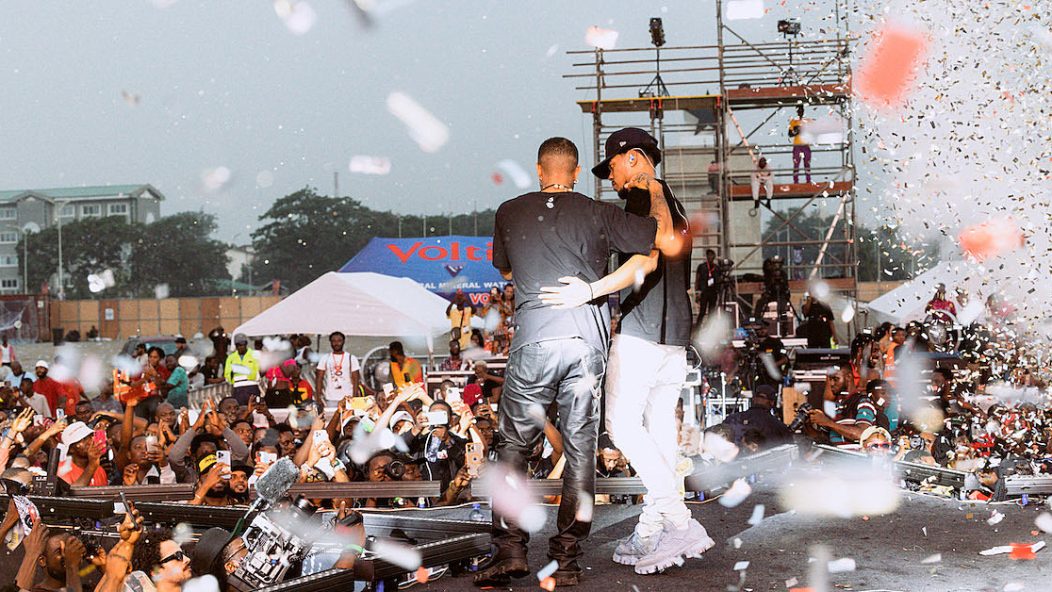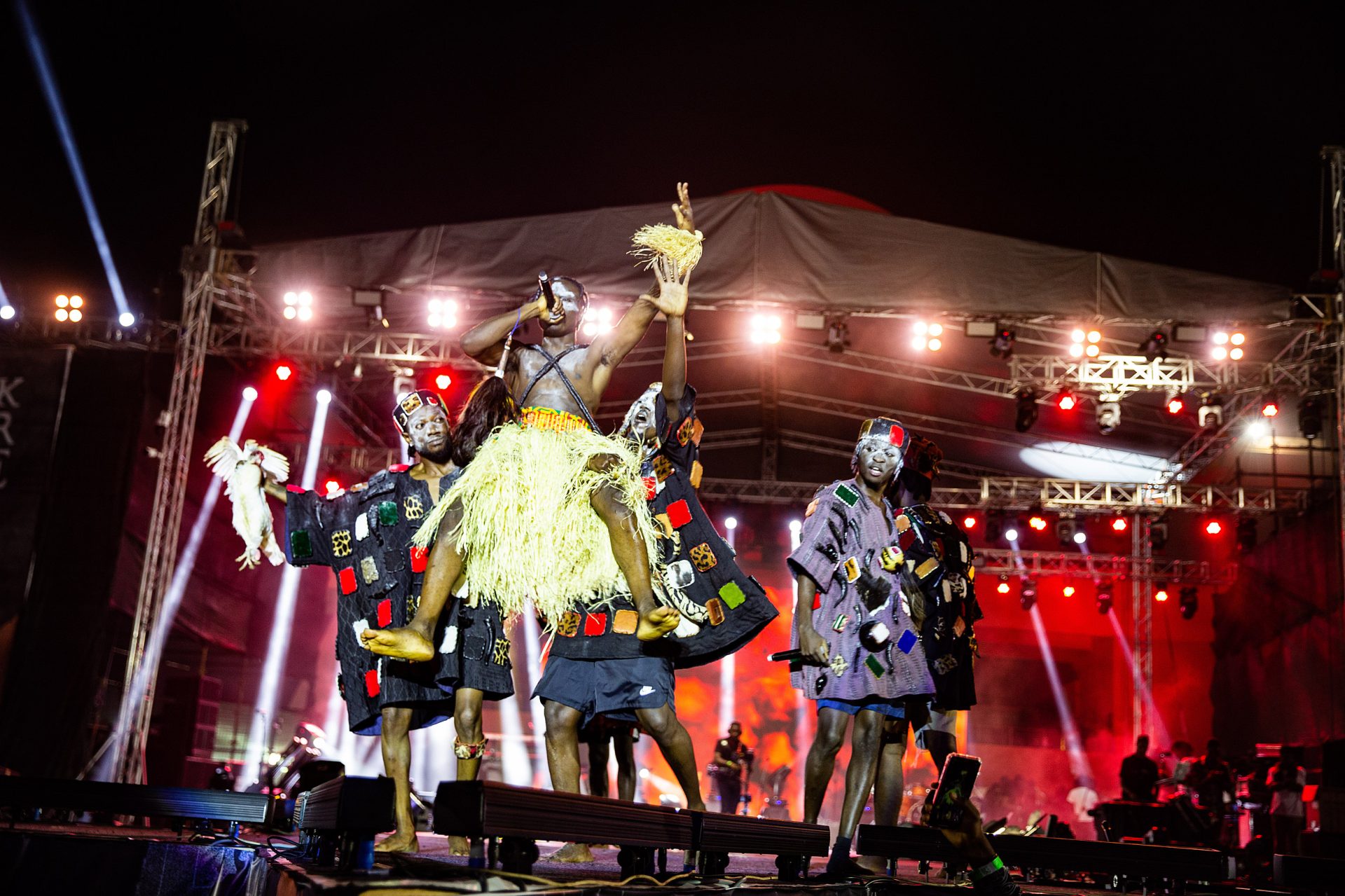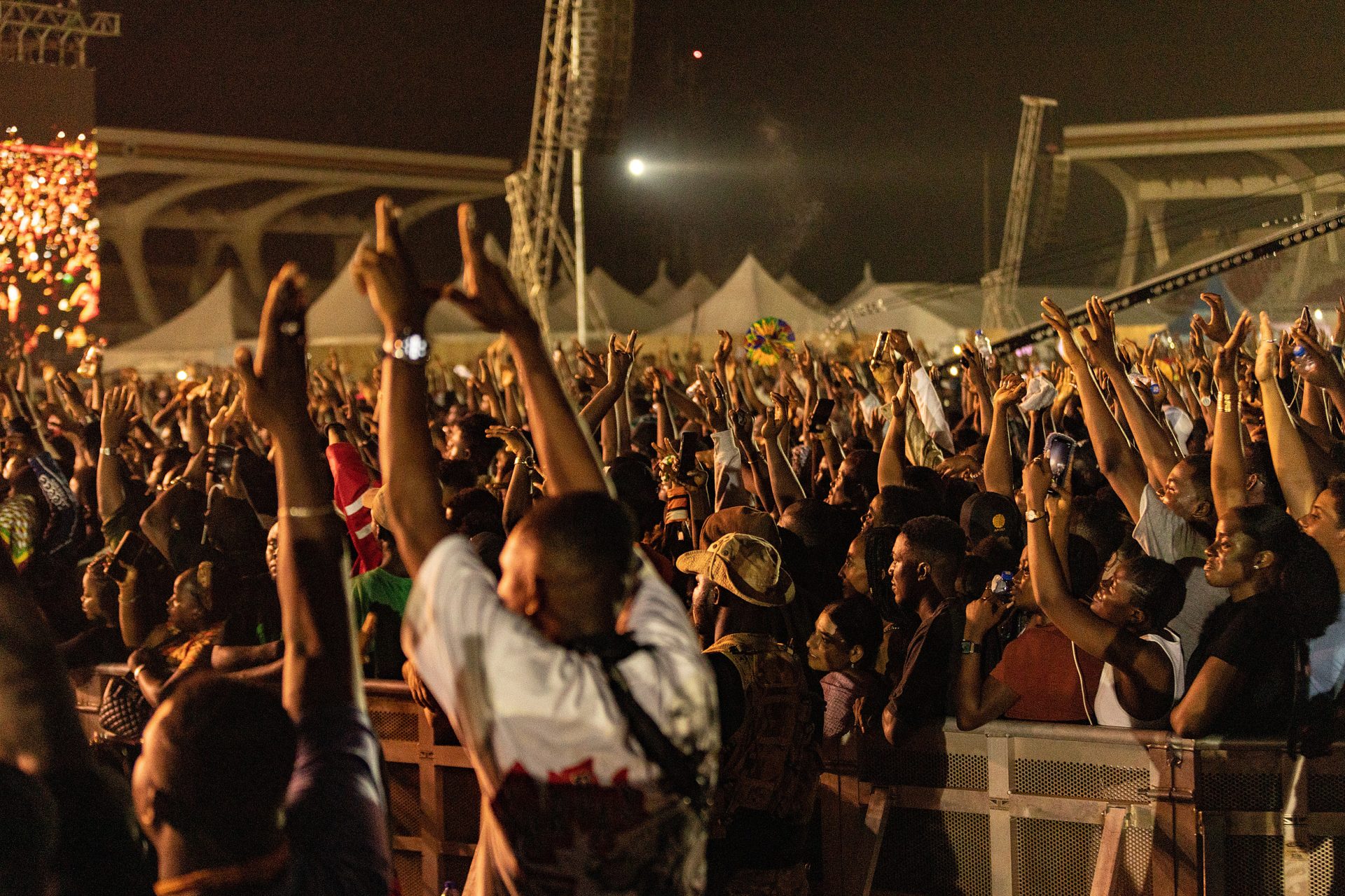
Vic Mensa on what Black Star Line Festival means for Ghana’s creative future
At 11 pm on Friday, January 6, the long, slightly steep path leading up to Ghana’s historic Black Star Square in Accra, the country’s capital, was packed full of people. At the main entrance of the Black Star Square arena, uniformed guards and police officers stayed put, refusing to let the restless crowd of young people inside where the highly anticipated, inaugural music and cultural festival Black Star Line Festival was taking place.
Many of the attendees had come from outside the country for the annual “Detty December,” a term used to describe weeks of festivities that take place across Accra from December to early January, and others were residents, eager to be a part of an event with a mission to bridge the gap between the African continent and the Black diaspora. There was only one problem, though: The event attracted more people than expected and reached maximum capacity just as it was getting started, and there were still a lot more waiting to be let in.
The inaugural Black Star Line Festival was a free concert organized by Ghanaian-American rapper Vic Mensa and fellow rapper Chance the Rapper as a way to connect the Black Diaspora with the African continent through creativity and music. The concert saw both homegrown names on the lineup, from legendary Ghanaian rapper Sarkodie to the Asakaa Boys and Stonebwoy, and international talent, including Erykah Badu, Jeremih, Meek Mill, Tobe Nwigwe, T-Pain, and Chance the Rapper and Vic Mensa themselves. The live music arrived on the last day of the fest and came after a week-long series of pop-up events and panel discussions organized by the Black Star Line team. 52,000 people were in attendance at the concert, marking an unofficial end to “Detty December.”

[Asakaa Boys at Black Star Line Festival / Photo by Christian Saint]
“My experience at Black Star Line Festival was amazing. The atmosphere was electric, from the music lineup down to the fashion,” says Ekow Barnes, a renowned Ghanaian writer and cultural expert. “With the camaraderie of my fellow Black people, all united in our shared love of the music and culture, it was truly an unforgettable experience that left me feeling uplifted and rejuvenated.”
The festival’s goal of bridging the gap between the continent and the Black Diaspora is one echoed by its host country Ghana. In 2019, the West African country launched “The Year of The Return” initiative, a travel campaign that seeks to position Ghana as a home for the Black Diaspora and as a place to reconnect with and discover some of their ancestral histories, while also maintaining a strong relationship with the African continent.
That said, the event is certainly a part of the nation’s living cultural history — and it builds upon its political history, as well. Black Star Line Festival draws its name and a bit of its mission from the Black Star Line, a shipping company founded in 1919 by Jamaican activist and political leader Marcus Garvey with the intention of providing Black workers between North America, the Caribbean, and Africa with economic opportunities. The historical significance of the fest is further heightened by the fact that it took place at the Black Star Square, the place where Ghana became the first African nation to declare its independence from colonial rule, leading the way for other countries across the continent to follow suit.
“So many of us in the Diaspora feel that Africa is this unattainably far away foreign land, especially those of us in America,” Vic Mensa, one of the main organizers, tells AltPress. “As we create more opportunities for our people to return home, I think the collaborations and relationships will form themselves. Even this past week opened doors for so many people to share in creativity and joy that may otherwise have never crossed paths.”

[The crowd at Black Star Line Festival / Photo by Desiree Appau]
Vic Mensa hasn’t always had a strong relationship with Ghana, his father’s birth country. As a child, the artist, who grew up in Chicago, visited once in a while, but never stayed long enough to immerse himself in the culture or build lasting connections. All of this changed, though, when he returned to Ghana in 2020. “When I started coming to Accra and really immersing myself in the youth culture, I began to appreciate the immense privilege that I have to be in direct communication with my heritage, to truly know where I come from,” he says.
As Mensa recently reconnected with his Ghanaian roots, he felt a “responsibility” to bridge the gap between the “two different worlds” he’s from. That, in essence, is where the idea for BSLF came from. He says, “I began to realize that we as Black artists are performing everywhere on the globe except for the continent of our origin. It’s an unsustainable relationship. The fans exist; they’ve been living, loving, and growing with the music, and the opportunities to connect with the artists just have not existed. It is from this realization that I began to dream of a festival that could serve as a vessel for Black artists to perform for the people of Africa.” So when Chance honored Mensa’s invitation to visit Ghana, Mensa shared his vision of a festival that would bring Africans and the Black Diaspora together, and immediately he came on board.
With Accra emerging as a global cultural destination, Black Star Line and other prominent events like Afro Nation and AfroFuture (formerly known as Afrochella), serve as an opportunity for the country’s cultural image.
For Mensa, the success of BSLF is a testament to how important the mission behind it is. “I only allowed myself to have ironclad faith, but I don’t think I knew exactly how huge it would be. Not only that, but there were no major problems; the sound worked, there were no stampedes, and no one got hurt. It was definitely divinely guided,” he says.

[Chance the Rapper at Black Star Line Festival / Photo by Desiree Appau]
The event truly felt like the start of a long-awaited partnership between Africa and the Black Diaspora. The arena was a large sea of Black faces all singing along, a first for many of the western artists who came to perform. T-Pain, for instance, regularly interrupted his performances to share how emotional that made him feel. The energy stayed high, with the show only drawing to a close around 6 in the morning.
The event has also garnered a fair amount of controversy, due to the invite of, and Chance’s defense of the invite of, comedian Dave Chappelle, who’s spoken out against the LGBTQ+ community in recent years. In a recent interview with Rolling Stone about the matter, the rapper said, “I wanted everyone to feel as welcome and communal as possible. And so if having Dave there made people feel like they weren’t, that they didn’t have space or that they weren’t welcome, that was not my intention.” Chappelle’s presence at the festival felt especially fraught, though, as Ghana is in the middle of passing a dangerous anti-LGBTQ+ law.
Beyond that, the sheer existence of the festival had been met with skepticism among some locals. While the country’s creative sector is booming, Ghanaians are also living through a high cost of living crisis, with the cedi falling drastically against the dollar. So as locals experience this period of severe inflation, there’s a sense of trepidation surrounding how an influx of tourists might affect their economy, and what role festivals like BSLF might play. “I will not pretend that this festival is the solution to the result of centuries of exploitation,” says Vic Mensa. “However, I have made sure that we are leaving behind value as opposed to removing it. For this reason, I’m building boreholes across Ghana to provide clean water to communities that need it.”
Barnes, however, believes that music festivals like this are beneficial to the country’s economy. “Cultural moments like this are a source of economic growth and job creation, both in the direct and indirect sense. It is an avenue to generate revenue for local businesses through increased tourism, and in the same vein, it creates jobs for people across the music, fashion, event planning, and hospitality industries,” he says.
Additionally, events like this are likely to set Ghana up as a prime location for international artist tours, thereby organically propping up the creative economy in the country.
“Beyond the economic benefits, it also has a positive impact on our country’s social and emotional well-being. These music festivals are a form of escapism from the harsh realities of the living crisis, providing us with an opportunity to come together and forget our troubles, even if it is for a little while,” he says.
Barnes continues, “Everyone wants to go where they are cherished. The energy of the crowd was very infectious at Black Star Line Festival. All throughout the show, the crowd was dancing, singing and getting the lyrics to the T. These are the things artists love to see, so why not?”
“The creative scene in Ghana is electric. It’s accelerating at a feverish pace; music, fine art, and fashion are all rapidly advancing. I believe we’re going to be seeing many more international artists performing on the continent moving forward. The reality is that the fan bases are engaged and awaiting, the infrastructure and initiative are what’s been lacking,” Vic Mensa says.
And as for what the future of the Black Star Line Festival looks like? Mensa envisions it to be “Internationally Black and beautiful.”










